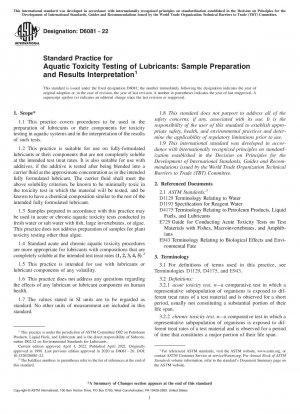ASTM D6081-22
Standard Practice for Aquatic Toxicity Testing of Lubricants: Sample Preparation and Results Interpretation
- Standard No.
- ASTM D6081-22
- Release Date
- 2022
- Published By
- American Society for Testing and Materials (ASTM)
- Latest
- ASTM D6081-22
- Scope
- 1.1 This practice covers procedures to be used in the preparation of lubricants or their components for toxicity testing in aquatic systems and in the interpretation of the results of such tests. 1.2 This practice is suitable for use on fully-formulated lubricants or their components that are not completely soluble at the intended test treat rates. It is also suitable for use with additives, if the additive is tested after being blended into a carrier fluid at the approximate concentration as in the intended fully formulated lubricant. The carrier fluid shall meet the above solubility criterion, be known to be minimally toxic in the toxicity test in which the material will be tested, and be known to have a chemical composition similar to the rest of the intended fully formulated lubricant. 1.3 Samples prepared in accordance with this practice may be used in acute or chronic aquatic toxicity tests conducted in fresh water or salt water with fish, large invertebrates, or algae. This practice does not address preparation of samples for plant toxicity testing other than algae. 1.4 Standard acute and chronic aquatic toxicity procedures are more appropriate for lubricants with compositions that are completely soluble at the intended test treat rates (1, 2, 3, 4, 5).2 1.5 This practice is intended for use with lubricants or lubricant components of any volatility. 1.6 This practice does not address any questions regarding the effects of any lubricant or lubricant component on human health. 1.7 The values stated in SI units are to be regarded as standard. No other units of measurement are included in this standard. 1.8 This standard does not purport to address all of the safety concerns, if any, associated with its use. It is the responsibility of the user of this standard to establish appropriate safety, health, and environmental practices and determine the applicability of regulatory limitations prior to use. 1.9 This international standard was developed in accordance with internationally recognized principles on standardization established in the Decision on Principles for the Development of International Standards, Guides and Recommendations issued by the World Trade Organization Technical Barriers to Trade (TBT) Committee.
ASTM D6081-22 Referenced Document
- ASTM D1129 Standard Terminology Relating to Water
- ASTM D1193 Standard Specification for Reagent Water
- ASTM D4175 Standard Terminology Relating to Petroleum Products, Liquid Fuels, and Lubricants*, 2023-07-01 Update
- ASTM E729 Standard Guide for Conducting Acute Toxicity Tests on Test Materials with Fishes, Macroinvertebrates, and Amphibians
- ASTM E943 Standard Terminology Relating to Biological Effects and Environmental Fate*, 2023-06-01 Update
ASTM D6081-22 history
- 2022 ASTM D6081-22 Standard Practice for Aquatic Toxicity Testing of Lubricants: Sample Preparation and Results Interpretation
- 2020 ASTM D6081-20 Standard Practice for Aquatic Toxicity Testing of Lubricants: Sample Preparation and Results Interpretation
- 2019 ASTM D6081-19 Standard Practice for Aquatic Toxicity Testing of Lubricants: Sample Preparation and Results Interpretation
- 1998 ASTM D6081-98(2014) Standard Practice for Aquatic Toxicity Testing of Lubricants: Sample Preparation and Results Interpretation
- 1998 ASTM D6081-98(2009) Standard Practice for Aquatic Toxicity Testing of Lubricants: Sample Preparation and Results Interpretation
- 1998 ASTM D6081-98(2004) Standard Practice for Aquatic Toxicity Testing of Lubricants: Sample Preparation and Results Interpretation
- 1998 ASTM D6081-98 Standard Practice for Aquatic Toxicity Testing of Lubricants: Sample Preparation and Results Interpretation
